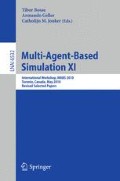Abstract
The dominant strategy among game theorists is to pose a problem narrowly, formalize that structure, and then pursue analytical solutions. This strategy has achieved a number of stylized insights, but has not produced nuanced game-theoretic solutions to larger and more complex issues such as extended international historical conflicts, or the detailed assessment of variegated policy alternatives. In order to model more complex historical and policy-oriented processes, it has been proposed that a broader computational approach to game theory that has the potential to capture richer forms of social dynamics be used, namely the ‘multigame.’ In the multigame approach there are multiple games each of which is open, prototypical, implicit, reciprocal, positional, variegated and historical. When later implemented, the multigame approach will offer the potential to rigorously model complex international historical conflicts and variegated policy alternatives that, heretofore, typically required qualitative analysis.
Access this chapter
Tax calculation will be finalised at checkout
Purchases are for personal use only
Preview
Unable to display preview. Download preview PDF.
References
Sallach, D.L.: Complex multigames: Toward an ecology of information artifacts. In: Sallach, D.L., Macal, C.M., North, M.J. (eds.) Proceedings of the Agent 2006 Conference on Social Agents: Results and Prospects, pp. 185–190. Argonne National Laboratory, Chicago (2006)
Sallach, D.L.: Interpretive agents and discourse-oriented games. In: Fourth Joint Japan-North America Mathematical Sociology Conference, Redondo Beach, CA (2008)
Kenny, R.W.: The good, the bad and the social: On living as an answerable agent. Sociological Theory 25, 268–291 (2007)
Carse, J.P.: Finite and Infinite Games. Ballantine, New York (1986)
Osborne, M.J., Rubinstein, A.: Bargaining and Markets. Academic Press, San Diego (1990)
Rummel, R.J.: Understanding Conflict and War: The Conflict Helix. John Wiley & Sons, New York (1976)
Rosch, E.: Principles of categorization. In: Rosch, E., Lloyd, B.B. (eds.) Cognition and Categorization, pp. 27–48. Lawrence Erlbaum, Hillsdale (1978)
Rosch, E.: Prototype classification and logical classification. In: Scholnick, E.K. (ed.) New Trends in Conceptual Representation: Challenges to Piaget’s Theory?, pp. 73–86. Lawrence Erlbaum, Hillsdale (1983)
Weber, M.: Economy and Society: An Outline of Interpretive Sociology. Translated by G. Roth and C. Wittich. University of California Press, Berkeley (1978)
Bendix, R., Lipset, S.M. (eds.): Class, Status and Power: Social Stratification in Comparative Perspective. Free Press, New York (1966)
Kemper, T.D., Collins, R.: Dimensions of microinteraction. American Journal of Sociology 96, 32–68 (1990)
Sallach, D.L.: Games social agents play: A complex form. In: Joint Conference on Mathematical Sociology in Japan and America, Honolulu (2000)
Moody, M.: Serial reciprocity: A preliminary statement. Sociological Theory 26, 130–151 (2008)
Hajek, O.: Pursuit Games: An Introduction to the Theory and Applications of Differential Games of Pursuit and Evasion. Dover Publications, Mineola (1975)
O’Brien, L.F.: No Final Victories: A Life In Politics From John F. Kennedy to Watergate. Doubleday & Company, New York (1974)
Craig Cleaveland, J.: An Introduction to Data Types, pp. 144–152. Addison-Wesley, Reading
Sallach, D.L.: Comparing objects composed by abstract relationships. In: Proceedings of the ACM Hawaii International Conference on the System Sciences, Kailua Kona, HI, vol. III, pp. 89–93 (1989)
Sallach, D.L.: Logic for situated action. In: Takahashi, S., Sallach, D., Rouchier, J. (eds.) Advancing Social Simulation: The First World Congress, pp. 13–21. Springer, Tokyo (2007)
Gintis, H.: Game Theory Evolving: A Problem Centered Introduction to Modeling Strategic Interaction, pp. 18–31. Princeton University Press, Princeton (2009)
Johnston, A.I.: Cultural Realism: Strategic Culture and Grand Strategy in Chinese History, pp. 109–117. Princeton University Press, Princeton (1995)
Heise, D.R.: Expressive Order: Confirming Sentiments in Social Actions. Springer, New York (2006)
Sallach, D.L.: Social theory and agent architectures: Prospective issues in rapid-discovery social science. Social Science Computer Review 21, 179–195 (2003)
North, M.J., Macal, C.M.: Managing Business Complexity: Discovering Strategic Solutions with Agent-Based Modeling and Simulation. Oxford University Press, New York (2007)
Herring Jr., G.C.: Lend-lease to Russia and the origins of the Cold War. Journal of American History 56, 93–114 (1944-1945)
Munting, R.: Lend-lease and the Soviet war effort. Journal of Contemporary History 19, 495–510 (1984)
Sallach, D.L.: Modeling emotional dynamics: Currency versus field. Rationality and Society 20, 343–365 (2008)
Author information
Authors and Affiliations
Editor information
Editors and Affiliations
Rights and permissions
Copyright information
© 2011 Springer-Verlag Berlin Heidelberg
About this paper
Cite this paper
Sallach, D.L., North, M.J., Tatara, E. (2011). Multigame Dynamics: Structures and Strategies. In: Bosse, T., Geller, A., Jonker, C.M. (eds) Multi-Agent-Based Simulation XI. MABS 2010. Lecture Notes in Computer Science(), vol 6532. Springer, Berlin, Heidelberg. https://doi.org/10.1007/978-3-642-18345-4_8
Download citation
DOI: https://doi.org/10.1007/978-3-642-18345-4_8
Publisher Name: Springer, Berlin, Heidelberg
Print ISBN: 978-3-642-18344-7
Online ISBN: 978-3-642-18345-4
eBook Packages: Computer ScienceComputer Science (R0)

